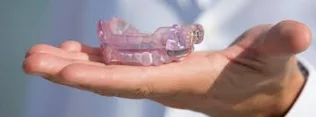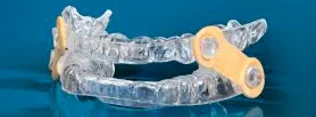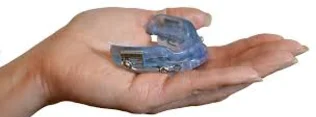Clearly, the largest number of patients suffering from obstructive sleep apnea are in the mild to moderate categories and should be treated with oral appliances. Even severe cases respond favorably. Despite the fact that treatment with the CPAP unit is successful, most patients cannot or choose not to wear the face mask with the attached air compressor. These patients are excellent candidates for oral appliances. The most recent data shows that using an oral device is superior to not using a CPAP or only using a CPAP a couple of hours a night. These patients prefer a non-surgical, non-invasive plastic intra-oral appliance that is only worn at night to help solve their problems.
Oral Appliances
Sleep apnea is a type of breathing disorder that is a serious, potentially life-threatening condition characterized by brief interruptions of breathing during sleep. There are basically three types of apnea:
- Mandibular Repositioner
- Tongue Retaining Device
It should be noted that since 1987 all medical devices, including oral appliances for the treatment of snoring and obstructive sleep apnea, are required to have marketing clearance from the FDA. These oral devices are covered by most major medical insurance and PPO plans, Kaiser, Medicare, and Tricare. We are also preferred providers for the above.
Types of Appliances
Dorsal Device

A commonly used mandibular advancement device. Click here to learn more.
EMA

This two-piece appliance consists of two plastic parts which cover the upper and lower teeth and are joined together with elastics. The advantage of this appliance is that it is extremely comfortable.
Herbst

This removable appliance is highly effective. The upper and lower acrylic components are held together by a plunger mechanism that holds the mandible forward in both the open and closed positions. The Herbst has the advantage of allowing the patient to open and close as well as providing some limited side-to-side jaw movement.
Continuous Positive Airway Pressure CPAP?
The current gold standard utilized by the medical profession for the treatment of OSA is continuous positive airway pressure (CPAP). The patient wears a tightly fitting nose mask which is strapped to the head and connected by a hose to an air compressor pump. The air is forced into the airway through the nasal passages in order to open up the airway.
Complaints about the use of this air blower include pump noise, voice changes, skin irritations from the mask, nose, and throat dryness, headaches from the strap around the head, tinnitus, difficulty getting to sleep, sinus infections, difficulty breathing out against the air being forced through the nose.
The patients who should use CPAP are those with severe cases of obstructive sleep apnea as the device may indeed be a life saver. In cases of mild to moderate OSA, or in cases where patients refuse to wear the CPAP, oral appliances may be the treatment of choice.
Replace CPAP’s
Oral Appliance can open your airway to eliminate snoring and sleep apnea. Click Here to learn how you can replace your CPAP.
Most Common Surgical Techniques
Laser-Assisted Uvulaplasty (LAUP)
The purpose is to surgically remove the uvula when it is excessive and deemed to be causing the problem.
Uvulopalatopharyngoplasty (UPPP)
This is the surgical removal of excess palatal tissue which is thought to be causing the problem.
Maxillomandibular advancement
This is the most invasive, yet the most successful in the properly selected case.
The disadvantage is that these surgeries can be quite painful during the healing period. Following the surgery, patients report voice changes and difficulty in swallowing their food. Patients should be informed of all their options prior to any treatment whether surgical or non-surgical.
Schedule an Appointment
If you have any questions or require immediate assistance, please don’t hesitate to contact us. We look forward to helping you improve your sleep and overall well-being.
DOWNLOAD FORM Contact Us EMERGENCY